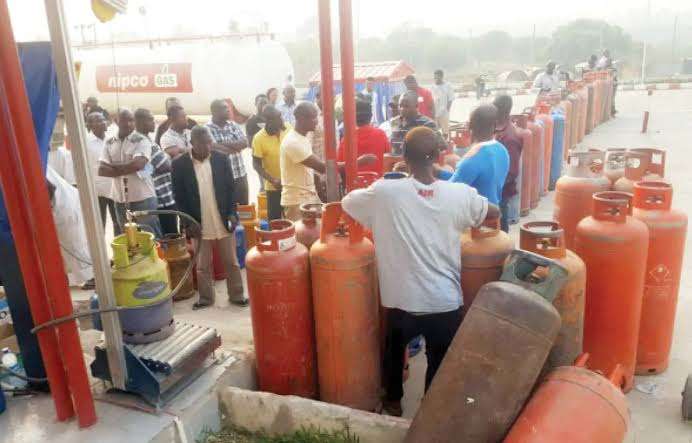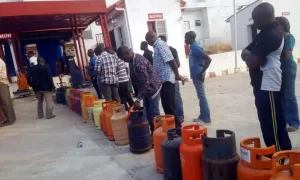Amidst ongoing concerns over the rising cost of energy, the price of Liquefied Petroleum Gas (LPG), commonly known as cooking gas, has escalated to N1,500 per kilogram.
This increase came as Nigerians continue to grapple with high petrol prices, placing additional strain on households that rely on gas for daily cooking needs.
NaijaTimesUSA has confirmed that the price of cooking gas has peaked at N1,500 per kilogram in some retail outlets in Ogun and Lagos States as of Sunday.
In Abuja, the average price for refilling a 12.5kg cylinder of cooking gas has increased by 41.6 percent to N17,000 across various areas. Just three months ago, the price was N12,000, while in January, it was sold for N11,735.
This price hike has raised concerns, especially in light of the promise made by the Minister of State for Petroleum Resources (Gas), Ekperikpe Ekpo, in August, when he promised to ensure a reduction in the rising cost of a kilogram of cooking gas.
The Commissioner for Environment in Ogun State, Ola Oresanya, voiced concern that many residents might resort to using charcoal for cooking if the trend continued.
The Managing Director/Chief Executive Officer of NIPCO Plc, Suresh Kumar, said the Dangote refinery and other domestic refineries would bring down the price of cooking gas, expressing concerns that over 60 percent of cooking gas consumed in Nigeria is being imported.
Speaking at the National Conference of the Nigerian Association of Liquefied Petroleum Gas Marketers in Lagos, Suresh Kumar noted that domestic production currently meets less than 40 percent of the 1.5 million metric tonnes consumed annually. He urged the government to encourage companies like Chevron to convert more propane into butane, which is more suited for household use.
“With the Dangote refinery and other refineries now sourcing crude oil locally, we expect an increase in LPG production, which should drive down costs,” Kumar said. “Greater local production will also help insulate the market from foreign exchange and international price fluctuations.”
READ ALSO: Egg Prices Set to Reach ₦10,000 Per Crate – Farmers Warn
Kumar further highlighted the need for government incentives to boost gas processing investments. NIPCO, he explained, has been preparing for such a shift since its founding in 2004, with the vision of becoming a leading LPG distributor.
“Our strategy was driven by Nigeria’s extensive gas reserves, over 200 trillion cubic feet,” he said. “We believe this resource should support not only domestic LPG use but also CNG for industrial and transportation sectors.”
Kumar also detailed NIPCO’s investments in infrastructure, including an expansion of its LPG storage capacity in Apapa from 5,000 to over 20,000 metric tonnes. This growth, he said, has been achieved through strategic partnerships and deploying LPG tankers across Nigeria to improve accessibility.
Despite the expansion in LPG consumption—from 50,000 metric tonnes annually when NIPCO entered the market to about 1.5 million tonnes today—Kumar believes there is still significant potential for growth. He noted that fewer than 60 percent of Nigerians currently use LPG.
“To truly harness our potential, we must increase supply to at least 5 million metric tonnes annually,” Kumar stressed. He added that ending gas flaring is critical, calling for investments to capture flared gas and convert it into usable energy.


